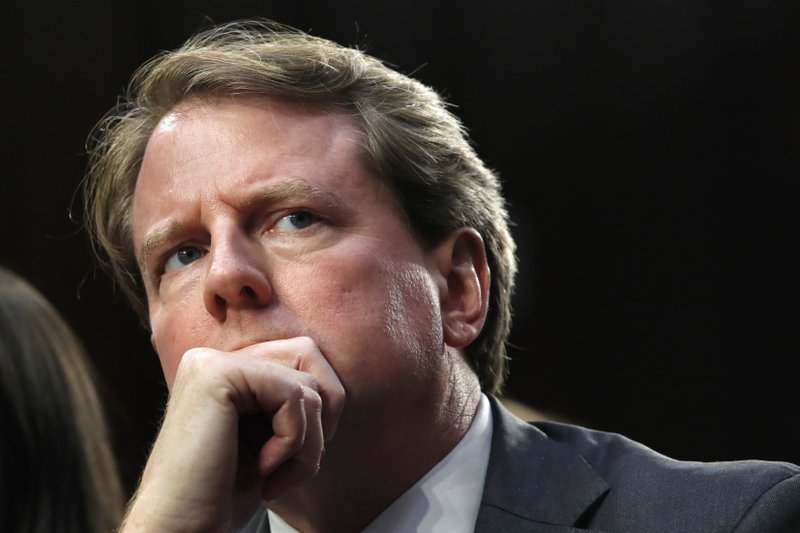
White House counsel Don McGahn, listens as he attends a confirmation hearing for Supreme Court nominee Brett Kavanaugh before the Senate Judiciary Committee on Capitol Hill in Washington on Sept. 4, 2018. (File photo: AP)
Federal appellate judges are wrestling with whether courts should be refereeing a dispute between the House of Representatives and the Trump administration over the testimony of former White House counsel Don McGahn, even in the face of what one judge called the White House’s “broad-scale defiance of congressional investigation.”
A panel of the US Court of Appeals for the District of Columbia Circuit heard arguments Friday over the House Judiciary Committee’s effort to compel McGahn’s testimony. The administration appealed after a trial judge rejected its broad claim that close advisers to President Donald Trump have complete immunity from congressional subpoenas for their testimony.
Judge Thomas Griffith, an appointee of President George W. Bush, pressed tough questions on both sides Friday, describing Trump’s directive not to cooperate with congressional investigations as “broad-scale defiance” that is possibly unprecedented in US history. Even so, Griffith wondered whether courts should get in the middle of a political dispute between the other two branches of government, especially when Congress has other powers available, including cutting off appropriations, stopping the confirmation of judges, even impeachment. “That’s what the separation of powers means,” he said.
The committee wants McGahn’s testimony as it examines potential obstruction of justice by the Republican president during special counsel Robert Mueller’s Russia investigation. But it has held open the possibility that McGahn’s testimony could be important in impeachment, even though the two articles of impeachment adopted last month by the House focus on Ukraine and events that occurred after McGahn left his White House post.
Even if McGahn eventually shows up at the committee, it’s unclear whether he would have much to say. Trump could assert executive privilege over some matters, though he allowed McGahn to talk extensively to Mueller’s investigators.
“What happens then? You’re back here?” Griffith asked.
The other two judges on the panel are Judith Rogers, an appointee of President Bill Clinton, and Karen Henderson, appointed by President George H.W. Bush.
Rogers seemed likely to side with the House. Henderson had only a few questions, although she indicated McGahn might have a strong interest in saying little to the committee to protect his conversations with Trump, his former client.
Democrats on the Judiciary Committee subpoenaed McGahn well before the start this fall of an impeachment inquiry centered on Trump’s request to Ukraine’s president that he investigate Trump’s Democratic rival Joe Biden and Biden’s son as well as an unsubstantiated conspiracy theory alleging Ukraine’s interference in the 2016 US presidential election.
The Justice Department has asked the appeals court to dismiss the case, saying there’s no reason for judges to become involved in a political dispute.
The department also says the need for resolving the case is less urgent now that the House has moved ahead with impeachment articles even without McGahn’s testimony.


